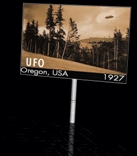George Washington and the Hand of God
by John White
FATE :: February 2008  The Founders of America were men who saw God working in human affairs to bless or to punish, depending upon whether people behaved righteously or otherwise. Many times they spoke and wrote of Divine Providence intervening on behalf of the Colonies in their struggle for independence.
The Founders of America were men who saw God working in human affairs to bless or to punish, depending upon whether people behaved righteously or otherwise. Many times they spoke and wrote of Divine Providence intervening on behalf of the Colonies in their struggle for independence.
The hand of God was notably evident in the life of the Father of Our Country. George Washington was indispensible to the American Revolution and to the first years of our fledgling republic. Instance after instance was attested to by him and others of what they recognized as divine intervention to protect him for a purpose: the creation of a new nation and a godly society. For example, in a letter to his wife Martha, written after the Continental Congress selected him to lead the Continental Army, he said, “I shall rely, therefore, confidently on that Providence which has heretofore preserved and been bountiful to me, not doubting but that I shall return safe to you.” Throughout his extensive military career, Washington was never wounded in battle.
Here are some vivid instances of Divine Providence at work in the life of George Washington, a man, if ever there was one, chosen by God and raised up to lead his country as an example to all the world.
In 1755, at the age of 23, George Washington, acting as a volunteer aide-de-camp, left Williamsburg with an expedition of 1,000 British regulars and 300 Virginia militiamen commanded by Gen. Edward Braddock. Their mission: to expel the French encroaching on the western lands claimed by England. Their target: Fort Duquesne, at the fork of the Allegheny and Monongahela Rivers, near present-day Pittsburgh.
Washington’s mother, concerned for his safety, tried to dissuade him. Washington replied, “The God to whom you commended me, madam, when I set out upon a more perilous errand, defended me from all harm, and I trust He will do so now.” (The “perilous errand” was a military venture against the French on the western frontier the previous year in which he and his men were defeated but allowed to return home.)
The army set out in late spring with its artillery, 150 wagons of provisions and equipment pulled by four horses each, about 260 pack and saddle horses, cattle for slaughtering along the way as food, and three companies of Virginia militiamen. An advance party of several hundred soldiers and axmen cut a 12-foot-wide path through the wilderness for the army to follow. The army itself stretched out in a thin column nearly four miles long.
Braddock was unfamiliar with the style of warfare used by the Indian allies of the French. Washington warned him of Indian ambushes, but the haughty British general ignored the warning.
By July, Braddock was within ten miles of Fort Duquesne. The French, aware of his presence via reports from Indian allies, set a trap. The number of French and Indian warriors was less than half that of the British, but the ambush would give them victory. They chose a ravine in which to attack the British from cover of trees and rocks. As Braddock’s troops entered the narrow opening, their concealed enemy commenced firing. Gunsmoke came from the trees, but not a man was seen by the British, who were totally surprised by the guerrilla warfare.
Unable to do more than return feeble fire at the invisible enemy, the advance party retreated in utter confusion. Braddock, farther back, hurried toward the sound of battle. He busied himself in forming his men into ranks and, unable to think past European battle tactics where men advanced upon other men across open fields in precise formations, ordered his men not to hide behind trees. Their bright red coats made perfect targets. French and Indian musket balls dropped the British by the hundreds.
The pandemonium lasted two hours. Braddock had five horses shot from under him and finally was shot in the right side and sank to the ground. He had been a special target, along with all his other mounted officers. The army was practically annihilated. More than 700 British soldiers were killed or wounded. The Colonials accounted for another 300 dead. The French and Indians had only 30 wounded, none killed. Braddock was taken from the field and died three days later.
What was Washington doing in all this slaughter? At first, being the only unwounded aide of Braddock, he rode over every part of the battlefield, carrying the general’s orders to subordinates. According to religious historian David Barton in his 1990 book The Bulletproof George Washington (WallBuilders Press, 2003), one survivor who saw Washington undaunted in the midst of battle later reported, “I expected every moment to see him fall. Nothing but the superintending care of Providence could have saved him.”
Upon Braddock’s fall, everything was abandoned to the enemy. The regular troops fled in confusion; the battle became a rout. Braddock had placed the Virginia militia in the rear because of his contempt for them as soldiers. Scarcely 30 were left alive. Washington organized them to defend the fleeing British. But the abandoned booty on the battlefield was more appealing to the Indians than taking still more scalps. They did not pursue the survivors, who returned to Williamsburg.
Washington later wrote of the battle and matter-of-factly said about himself: “…by the all-powerful dispensations of Providence I have been protected beyond all human probability of expectations, for I had four bullets through my coat and two horses shot under me, yet escaped unhurt, although death was leveling my companions on every side of me!”







